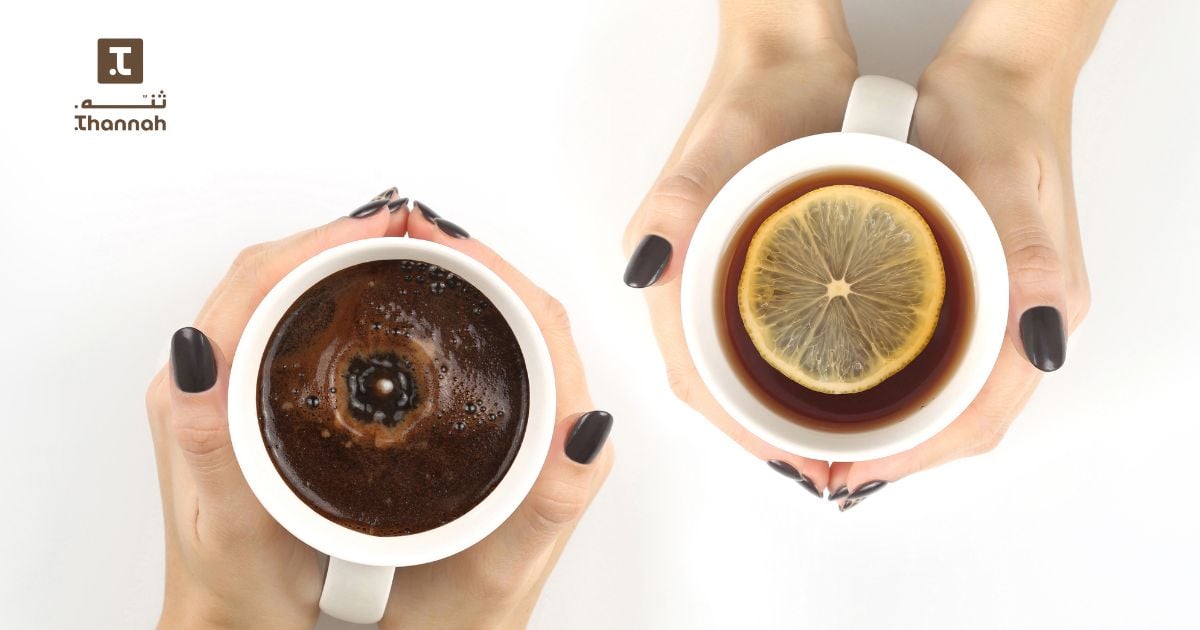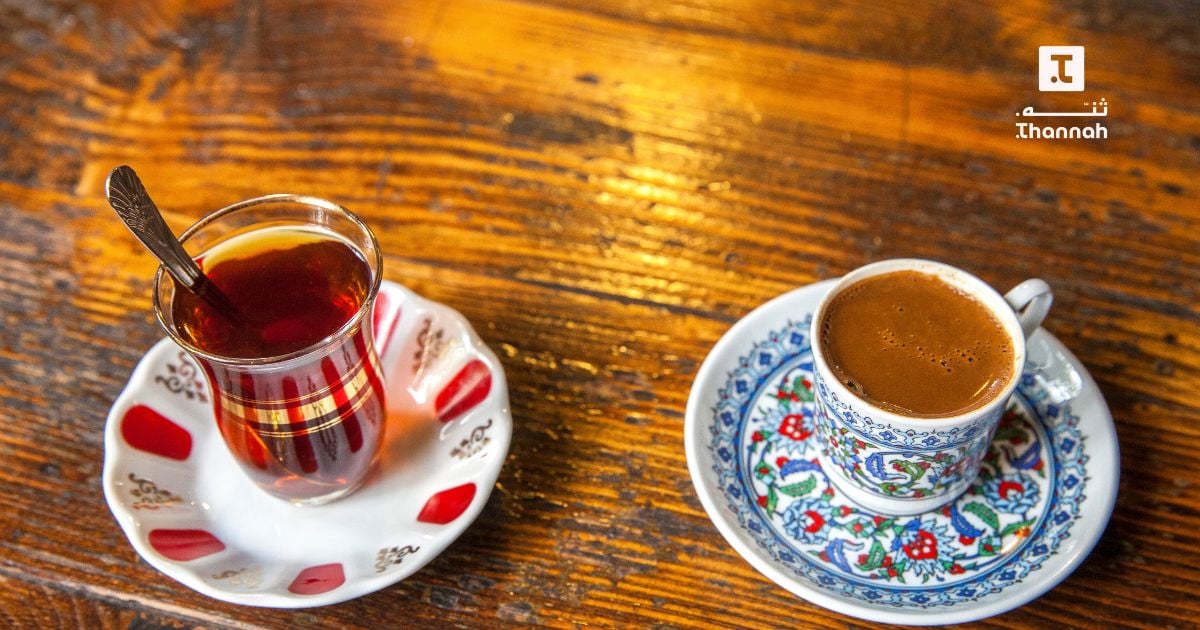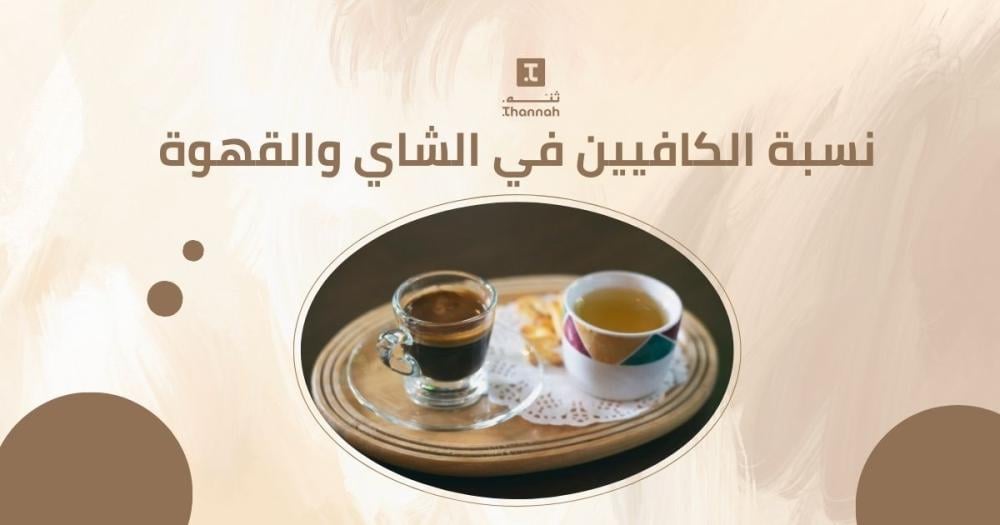Every morning, we start our day with a cup of coffee or tea, looking for focus or a boost of energy. But behind this simple daily ritual, there is caffeine. Here, the question arises: which beverage has the highest caffeine content? Is it tea or coffee? With Thana, the best coffee and tea store, we will learn about the caffeine content in tea and coffee and the factors that control it, to help you choose what suits your taste and daily needs without any harmful effect on your health.
What is caffeine?
Caffeine is found naturally in the leaves and fruits of some plants. It is also found in coffee, black and green tea, cocoa, soft drinks, and energy drinks. It may also be found in chocolate bars and some over-the-counter medications, such as cough syrup and diet pills.
Caffeine is a stimulant, meaning it increases brain and nervous system activity and increases the flow of chemicals like cortisol and adrenaline in the body. In small doses, caffeine makes you feel refreshed and focused, but in large doses, it can cause anxiety and difficulty sleeping.
As with many other medications, it is possible to develop a tolerance to caffeine, meaning you need larger and larger doses to achieve the same effect, so you should be careful.

The caffeine content in tea and coffee...which is higher?
Most people know that coffee contains more caffeine than tea, right? This isn't entirely true. While brewed coffee contains more caffeine than brewed tea, tea leaves contain more caffeine than coffee beans.
Before brewing, tea leaves contain more caffeine than coffee beans, but after brewing, the picture is completely different. A cup of coffee contains more caffeine than a cup of tea, and the reason is simple: the way coffee is prepared makes it more concentrated.
Coffee is brewed at a higher temperature and is left to stand for a longer period of time, which helps extract more caffeine, while tea, even strong black tea, doesn't release the same amount of caffeine, either because of the composition of its leaves or the nature of the brewing process.
Caffeine content in coffee
The amount of caffeine in a cup of coffee varies depending on the type, serving size, preparation method, type of coffee bean, and other factors. Coffee is the primary dietary source of caffeine, but this amount varies depending on the coffee beverage.
Now, how much caffeine is in a regular cup of coffee? The type of coffee you drink is the main factor that determines the caffeine content. For example:
brewed coffee
Brewing is the most common method of preparing coffee around the world. Brewed coffee, also known as regular coffee, is prepared by pouring hot or boiling water over ground coffee beans. A cup of brewed coffee may contain between 113 and 247 mg of caffeine.
aged coffee
Aged coffee is not served in a hurry. It is a type of coffee that requires calm preparation and patience. It is prepared using filter paper, where hot water is poured over the ground coffee, trapping the undissolved grounds on the paper, and extracting the pure beverage drop by drop into the cup.
The caffeine content in this type of coffee is balanced, sufficient to awaken the mind without weighing down the body. This type of coffee is drunk quietly, and is appreciated as a moment of rest in the middle of a crowd.
cold brew coffee
Cold brew coffee is a unique beverage in its method and flavor. It's prepared by steeping ground coffee in room-temperature water for 8 to 24 hours, allowing the flavor to develop without rushing. It's less acidic than hot brew coffee and has a higher caffeine content, ranging from 153 to 238 milligrams.
instant coffee
Instant coffee is ready to drink in seconds, making it a favorite companion for many people on busy mornings or during work hours. All it takes to prepare it is pouring hot water over the dry granules, which dissolve immediately and prepare your cup.
This type contains less caffeine than freshly brewed coffee, with a single cup containing around 62 milligrams, which is ideal for those looking for a mild stimulant that doesn't cause jitters or palpitations.
espresso coffee
Espresso is known for its high concentration and strong flavor. It is prepared using a machine that forcibly presses hot water into finely ground coffee. Although the amount of espresso in a cup is small, often no more than 30 milliliters, its caffeine content can reach approximately 63 milligrams.
Caffeine content in Turkish coffee
There are many factors that affect the strength of Turkish coffee, specifically caffeine content. Typically, a cup of Turkish coffee is between 2 and 5 ounces, and each cup contains approximately 50 to 65 mg of caffeine.
Turkish coffee is typically made from Arabica beans, and its strength can vary depending on the method of preparation. The average caffeine content is calculated by the teaspoon of ground coffee used to prepare the drink. For example, some homes in Turkey prefer to add two teaspoons of ground coffee, which doubles the caffeine content and results in a much stronger cup.
Caffeine content in Arabic coffee
Arabic coffee is an authentic drink of the Middle East. It is a traditional beverage served with dates and sweet fruits. Arabic coffee has a unique flavor thanks to its roasted beans. Furthermore, its preparation method differs from other types of coffee. As for the caffeine content of this distinctive coffee, the average concentration in Arabic coffee is 4 mg.
Caffeine content in tea
Black, green, white, yellow, and oolong teas all come from the same plant, Camellia sinensis. The difference in taste and type of tea lies in how the leaves are processed after picking and how the oxidation process takes place.
Does oxidation affect the amount of caffeine? No, not definitively. Below, we'll learn about the caffeine content in different types of tea with Thana, the best Saudi tea store:
Caffeine content in red tea
Red or black tea is known to have the highest caffeine content compared to other types of tea. The caffeine content in this tea varies depending on the preparation method, but it usually ranges between 64 to 112 milligrams in each average cup (about 240 milliliters).
Caffeine content in Chinese black tea
Chinese black tea, also known as oolong tea, contains between 29 and 53 milligrams of caffeine in a single cup, which is an average amount that provides moderate energy without severely affecting the nervous system.
Caffeine content in green tea
Green tea has a medium caffeine content, with one cup containing approximately 25 milligrams of caffeine. This gives it a mild stimulating effect compared to black tea or oolong tea. Therefore, there is a significant difference between the caffeine content of green tea and coffee.
Caffeine content in tea with milk
Some people believe that adding milk to tea can completely eliminate caffeine, but studies have shown that adding milk to tea or coffee does not reduce caffeine levels. When milk is added to a cup of tea or coffee, the caffeine content remains the same. An average cup of black tea with milk contains about 47 mg of caffeine.
white tea
White tea stays in the quietest corner, not loud or imposing, but leaving an unforgettable impression. Its caffeine content does not exceed 15 milligrams per cup, which is the lowest among all types of tea. That is why it is drunk for relaxation, not for awakening, for clarity, not for alertness.
Other types of tea
There are some herbal drinks whose infusions are called tea, such as mint and sage. They are drunk in the same way as tea, but they are not classified as tea and do not contain any caffeine.

Factors affecting the caffeine content in tea and coffee
There are factors that greatly influence the increase or decrease in caffeine levels in tea and coffee. Here are some:
Influencing factors associated with tea
- Leaf type: The primary factor that determines caffeine levels is the type and genetic makeup of the leaf, as some types naturally contain a higher concentration than others.
- Amount of leaves used in preparation: The more leaves, the higher the caffeine content in the cup.
- Water temperature: It plays an important role in determining the caffeine content in tea, as hot water releases caffeine more quickly than lukewarm water.
- Effect of steeping time: Leaving the tea in the water for a longer period results in extracting a greater amount of caffeine.
Influencing factors associated with coffee
- Bean Type: If you're making your coffee with Arabica beans, they have about half the caffeine content of Robusta beans.
- Bean Height: This may seem strange, but another factor that affects the amount of caffeine in coffee is the altitude at which the beans are grown. The higher the altitude, the lower the risk of mold and parasites. Therefore, the plant doesn't need to defend itself against them, and the caffeine content will be lower.
- Roasting: Coffee contains more caffeine after roasting because the coffee bean loses some of its weight during roasting due to evaporation. When roasting too dark, a stage known as "pyrolysis" begins, where the bean begins to burn from the inside. At this stage, the caffeine content may decrease slightly.
- Grind size: Preparing coffee beans with a smaller grind size produces coffee with a higher caffeine content.
- Water temperature: Brewing with hot water extracts more caffeine from the coffee grounds.
- Brewing Methods: Whole-ground immersion methods produce coffee with a higher caffeine content than other brewing methods.
How much caffeine is allowed per day?
Consuming up to 400 mg of caffeine per day appears to pose no health risks for most adults. This amount is roughly what is found in four cups of coffee. Although caffeine use may be safe for adults, it is not good for children. Teenagers and young adults should be warned against excessive caffeine consumption.
Even among adults, excessive caffeine use can cause unwanted side effects, so drink it in moderation whether you're a tea or coffee lover.
The best types of tea and coffee in Thana store
In every cup of Thana products, there is a story of taste that begins and reaches your taste as it should. We deliver to you a distinctive flavor, a good taste, and quality worthy of your time. At Thana, we have chosen for you a selection of the best that is offered, whether you are a fan of a light taste or a lover of a strong flavor:
- A mild blonde Saudi coffee with a balanced flavor and a subtle touch, beloved by coffee lovers for its authenticity.
- Cardamom coffee carries with it the scent of old gatherings and the flavor of authentic Arab generosity.
- Saffron coffee is a blend of luxury and warmth that you get in one sip.
- Clove coffee for lovers of unique flavors that leave a long-lasting effect after the last sip.
As for tea lovers, we will never forget their taste:
- Jamr tea With its strong flavor and traditional method, it satisfies the taste of lovers of strong tea.
- Northern tea with its balanced flavor and history in every cup, emulating the atmosphere of the desert and the tranquility of the north.
Each product is carefully packaged and easy to prepare, so you can enjoy the experience from the first scent to the last drop. All you have to do is choose your taste and prepare your meal. Order now.
Frequently Asked Questions
Does tea contain more caffeine than coffee?
Before brewing, tea leaves contain more caffeine than coffee beans, but after brewing, coffee contains more caffeine than tea. This difference is due to the method of preparation and the duration of steeping or brewing.
Which is stronger, tea or coffee?
Coffee is more potent than tea in terms of its effect on concentration and alertness, due to its higher caffeine content and more intensive extraction method. Even small amounts of coffee have a stronger effect than tea.
What is the most caffeinated drink?
Espresso is one of the most concentrated caffeine-containing beverages, but in terms of total caffeine content, filtered coffee, such as Americano, may contain more caffeine. Some energy drinks even outperform both, but they are artificial, not natural.
Is tea more of a stimulant than coffee?
Tea is considered a mild stimulant, with a calmer and longer-lasting effect than coffee, but coffee provides a faster and stronger stimulant boost in a short time. In terms of strength, coffee is superior, but tea is suitable for those seeking balance and calm.

